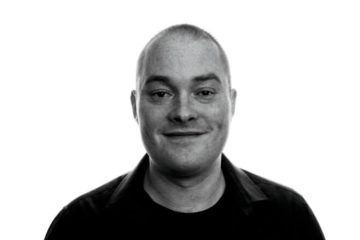We’ve been working with Jonny Ward, The Anxious Firefighter for four years. He is the expert behind our course: Mental Health Awareness Training for Managers, so we wanted to catch up with him to find out more about his journey, both through his own personal mental health experiences as well as his professional work. When he’s not working with us as a Hub Events trainer, Jonny is a qualified practicing psychotherapist alongside his main career: a full-time firefighter. Read on to find out a bit more about how Jonny does it.

Meet Jonny, a BACP registered psychotherapist, Watch Manager in the Fire and Rescue Service and an experienced mental health trainer. Jonny is also an executive for the BACP’s workplace mental health division.
How do you prepare the best possible environment for your training?
There are definitely some basics to cover, and two facets to it, whether it’s a face-to-face course or on Zoom. For a virtual course I will set myself up in the way you’d expect (quiet, comfy room with a decent cup of coffee), but being in person in a training room is obviously a bit different. In a venue, especially if it’s an in-house course, I always feel like a dog that has to have a sniff around the room and get used to the environment!
I need to make myself feel comfortable in that space and then set the room up in a way that feels inclusive. Because mental health is such a personal and interpersonal subject, it’s really important to create an environment where people feel comfortable. Mental Health Awareness for Managers is about helping leaders create environments where their teams and themselves feel comfortable discussing things and talking openly.
So how do you prepare the content of the courses you deliver?
It’s an ever-evolving process. Sometimes, I look back at the PowerPoint I delivered when I first started and I can cringe a little bit. Not because it was awful, but just because of how much it’s moved on from where it all began for me.
My client work without doubt has a huge influence in the way I shape my content. As a psychotherapist, I can identify things from sessions, anonymously of course, that adds insights into my training. Clinical work can heavily inform what I try and get across. I’ll also consider industry best practices. I draw a lot from my work with the British Association for Counselling Psychotherapists (BACP), as I’m one of their workplace executives. We have meetings about best practices in the workplace as that’s something that is constantly changing and evolving. I also work with contacts in the Health and Safety Executive (HSE). They have their own legal requirements for things like stress risk assessments, so I’ll take elements from that. Finally, I draw on my own practice as a manager. I always remind myself; one of the things I think gives me a bit of buy-in is that whilst I’m a mental health professional and a psychotherapist, I’m also a line manager in the fire service so I can empathise with the managers on my courses.
Can you share a little bit about the moniker ‘The Anxious Firefighter’? Where did that come from, and how has it shaped and influenced what you do?
The Anxious Firefighter came about around 2013. It was a Twitter/X handle that I used to talk about my own experiences of anxiety and low mood – I used it to post about mental health and my own experiences of it. It stood out to me as it presented a bit of a dichotomy: firefighters known generally for being brave but also having a vulnerable side as well. Ten years ago, mental health was still an emerging subject, much more in its infancy. Conversations around mental health were different, and, though I’m not saying my contribution made massive headway, I do think I added a little bit to it.
I got invited to appear on radio shows and write articles and was on BBC Radio 4 a couple of times talking about my experience of anxiety as a firefighter. From then, I got asked to come into companies and just do open talks about my experience of anxiety, mainly in traditionally male-orientated companies like construction. It shifted from being just a Twitter handle to actually making it my company name, and honestly, it just went from there. It was never a business plan; I just keep getting asked to do stuff, so I do it!
How do you manage to juggle your career in the fire service, psychotherapy work and training with the Hub Events?
The fire service is my career, that’s my job, that’s what I do. But because of the nature of the shifts, we work four days on four days off, which gives me time in the week when I can fit in training and psychotherapy. I enjoy what I do, in fact, I love what I do. I love promoting mental health in the workplace because I think it can make a massive impact.
What was it that inspired you to train in the field of mental health?
I studied psychology at university, it’s always been an interest of mine, I kind of let it go when I left university and realised I wanted something different and joined the fire service. I was drawn back into it when I started to struggle with my own mental health, I found the psychology of it fascinating. It was what drove me to train as a therapist. Dealing with some of the traumatic things at work and seeing the effects on friends and colleagues inspired me to help provide support within the fire service. I was allowed to take a couple of months off the engines and set up a wellbeing department at work. That in turn drove me into psychotherapy and discovering more about what could be done within a workplace.
I learned the importance of influencing those people in the workplace who have control, people who can change policy, people who hold social power. If you can help them to create environments where people feel safe and trusted and secure then that’s the real difference you can make. And that’s what’s really important about the Mental Health for Managers course.
It took me a long time to get to that point. I used to teach Mental Health First Aid, and I don’t really do that anymore. I realised from the journey I went through, I shifted from thinking, ‘You’ve got a mental health problem, this is for you to manage’ to ‘What’s causing it? ‘
Poor mental health is quite often a response to poor environments. We’re very good at pinpointing mental health awareness and identifying some signs of poor mental health. But why aren’t we looking at preventative measures within an organisation? Toxic work environments, bullying, harassment, workloads – what support is offered? And how is change is managed? These are all things that contribute to making people unwell. It’s almost like a house fire, if you let it burn itself to the ground, it will. We have to put safeguards in to keep people safe. And it’s the same with mental health in the workplace.
This year’s World Mental Health Day has the theme: Mental health is a universal human right. How is this date important to you, and what does the theme mean to you?
World Mental Health Day does a great job of bringing this into universal consciousness and highlighting the need for change. I think it’s a good day to have a springboard to push forward but the specific date is not important to me, which might sound kind of ironic, but it’s not. If you’re going to make mental health a human right, then it needs to be a structural thing. Just talking about it or having a couple of people posting images of themselves on World Mental Health Day going out for a jog doesn’t really change anything. People don’t get mentally ill because they’re not aware of mental illness. People get mentally unwell because of the environments that they’re forced to live with.
What needs to be pushed forward are things like funding, safeguarding procedures and other fundamental, structural changes that can truly make a difference.
What advice would you give to anyone thinking of attending one of your training courses?
Come with an open mind. I think with mental health, sometimes people have got preconceptions. I’d encourage people to try to leave your judgments at the door. We all have our ideas and our experiences of what it is to be a human being. It’s not always the same as others.
And last piece of advice – a big one – explore the human condition. Mental health is not all in people’s heads. It’s very much in our environments, in our upbringings in our economies – in all sorts of things. So, leave labels of illness at the door and consider the wider aspects of the human condition and what that might mean for us all.
If you want to know more about how The Hub Events can help your organisation learn, inspire and thrive, get in touch today! You can find out more about Jonny and our other amazing trainers here.







